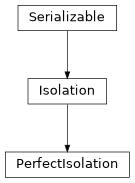Perfect Isolation¶

The perfect isolation implementation is HermesPy’s default isolation assumption, leaking no power from transmit to receive antennas and therfore modeling perfect / ideal isolation.
Configuring a SimulatedDevice's
with a perfect isolation model is achived by setting the isolation
property of an instance..
1# Create a new device
2simulation = Simulation()
3device = simulation.new_device()
4
5# Specify the device's isolation model
6device.isolation = PerfectIsolation()
- class PerfectIsolation(device=None)[source]¶
Bases:
IsolationPerfect isolation model without leakage between RF chains.
- Parameters:
device (
SimulatedDevice|None) – Device the model is configured to.
- classmethod Deserialize(process)[source]¶
Deserialize an object’s state.
Objects cannot be deserialized directly, instead a
Factorymust be instructed to carry out the deserialization process.- Parameters:
process (
DeserializationProcess) – The current stage of the deserialization process. This object is generated by theFactoryand provides an interface to deserialization methods supporting multiple backends.- Return type:
- Returns:
The deserialized object.
- leak(signal)[source]¶
Compute leakage between RF transmit and receive chains.
- Parameters:
signal (
Signal|None) – The signal transmitted over the respective antenna RF chains.- Return type:
Returns: The signal components leaking into receive chains.
- Raises:
FloatingError – If the device is not specified.
ValueError – If the number of signal streams does not match the number of transmitting antennas.
ValueError – If signal is not specified but required.